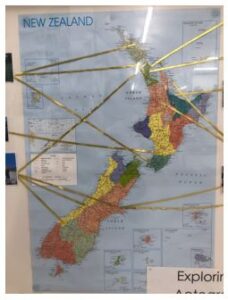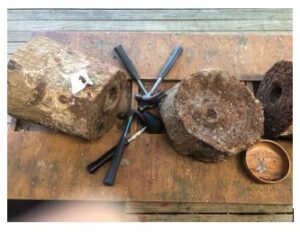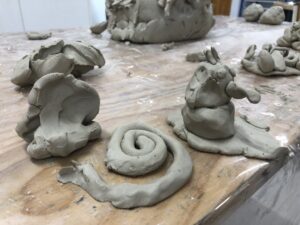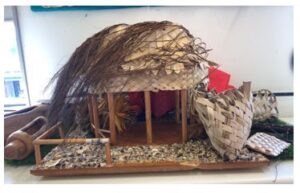As New Zealand commemorates Waitangi Day, Karen Horsley reflects on learning in collaboration with kaiako (educators), tamariki (children) and places in two Early Childhood Education (ECE) centres in New Zealand.

Waitangi Day is a national day in Aotearoa, New Zealand that commemorates the first signing of its founding document: Te Tiriti o Waitangi, The Treaty of Waitangi, on 6 February 1840 (https://www.waitangi.org.nz/). The historical, political and cultural significance of Te Tiriti o Waitangi, The Treaty of Waitangi informs the foundations of Aotearoa, New Zealand’s bicultural and bilingual early childhood curriculum – Te Whāriki. Te Whāriki honours Māori Indigenous knowledge, ways of being and Te Reo Māori language into culturally responsive provision that values New Zealand’s diverse communities, including from the Pacific Islands.
Here are some of my reflections, that particularly struck me from my visit to two early childhood education (ECE) centres in different parts of Auckland, New Zealand. Both centres were teacher-led. The first centre serves culturally diverse communities that was originally set up to support the city hospital community. The second centre, was founded on the honoring and building of Samoan language and cultural values. The organisation built on the legacy of Samoan mamas (elders) who set up the original playgroups, whilst recognising the rich diversity of New Zealand’s communities. The directors, teachers and practitioners in both settings highly value and embed Te Whāriki early childhood curriculum into culturally responsive practice. Te Whāriki is a living document in the sense that it is interpreted in ways that are meaningful for the particular contexts of ECE centres, their families and communities.
- AROHA – ALOFA (love): Relationships are everything
“First of all, it’s not me. It’s an us, it’s a we. It goes back to it takes a village to educate a child”
– Liz, second centre, 2023
This sense of ‘us’ not ‘me’ shone out in the beliefs and practices of all of the teachers I met. I noticed the loving care with which babies and young children were gently carried, held and spoken with as they explored and played, or simply enjoyed a quiet moment together. Sometimes, the most intangible or fleeting of moments, communicated the deeply held feelings and values of Aroha – Alofa that respected children’s rights and ‘mana’: including spiritual power, wellbeing and agency (Rameka et al., 2022). For example, teachers observed so closely to ask how and when babies would like to be held or picked up. They respected babies’ and children’s time and space to fully explore their environment, perhaps in the garden or park as babies crawled and walked barefoot over many textures and surfaces on offer to them (bark, paving, grass). Children and adults enjoyed playful moments and times of helping each other arrive at new theories, puzzling together. The children knew they would be listened to and their voices would be heard and this knowing led to a sense of collective learning, care and collaboration with the world. Pedagogies of Aroha – Alofa (love) and care meant that conditions were created for learning rather than adults feeling the need to ‘teach’. Teachers are confident for children to lead their learning and collective inquiry. Both centres cultivate a culture of true belonging and the courage to be real. Looking after relationships and others is very much at the heart of leadership and practice guided by intergenerational cultural philosophies, values and commitment to nurturing relationships and repairing them if this is necessary. ECE is infused with values such as Aroha – Alofa, service and respect, where teachers and leaders seek relationships of trust, collaboration and collective approaches. Rich Māori and Pacific Indigenous knowledge, spirituality and ways of being here speak to the ‘we’ and ‘us’ of leadership that support others to thrive.
- Collective over individual: A culture of children, teachers, families and communities co-learners and researchers together

The Te Whāriki curriculum, research and practice reflects a blend of contemporary and traditional Indigenous and non-Indigenous multiple perspectives, framed and centred around Māori philosophy. People doing things together, trusting one another, constructing new knowledge together reflects this. Trust, in one another and the children as leaders of their learning are highly valued in living, learning and researching together. Teachers in New Zealand ECE are referred to as “kaiako”, which is inclusive of all those who care and educate children in ECE settings (i.e., qualified teachers, educators, parents, elders and communities). It also incorporates the Māori concept of “ako” to acknowledge a reciprocal relationship between teachers and learners and learning from one another. A striking feature of the curriculum and practice was teachers’ very high regard and respect for children as highly competent learners. Children are encouraged to explore first with adults observing as engaged listeners and participants. Kaiako truly followed the children’s lead in their interests to develop theory making and threads of learning together in reciprocal relationships. They held back from talking and offering resources to see where children’s interests took them. Sometimes these led back to journeying and playing with younger siblings in mixed age play, talk, stories, creative media of all kinds and rhymes in community languages. Family and community members are seen and heard in the centres as very much part of everyday living, learning and researching alongside one another. Cultures of inquiry lead to children’s and teachers’ deep reflection on their learning, interests and evolving theory making. Communities are very much part and parcel of everyday life that honours Indigenous Māori and Pacific contemporary and traditional knowledge and practice – past, present and future.
3. Bringing your whole self to your work

Bringing your whole to your work, including language, family values, beliefs, knowledge and experiences through many languages, song, stories, metaphors, research and everyday conversations are seen as strengths. There is patience with one another in puzzling out the inevitable challenges of highly complex and nuanced ECE practice. Regular and informal meetings in daily life and inquiry in the centres create contexts for paying close attention to one another and asking difficult questions of practice that embrace uncertainty and vulnerability to move forwards together. There are playful times and (un)comfortable silences for thinking, and depths of patience and awareness for emerging new lively perspectives and possibilities:
E tūtaki ana ngā kapua o te rangi, kei runga te Mangōroa e kōpae pū ana
The clouds in the sky gather, but above them extends the Milky Way.
Bringing your whole self to your work deeply respects and appreciates the interwoven languages, knowledge, culture and stories of everyone. I learnt that Indigenous communities around the world, such as the Māori and Pacific peoples of New Zealand derive insight and wisdom about practice and leadership from their unique Indigenous perspectives and beliefs. In the two centres, Māori or Pacific (Samoan) Indigenous values guide their thinking about leadership practice in [ECE]. Indigenous perspectives focus on collective decision-making, serving the interests of the community, harmonious relationships, ancestral wisdom, and a deep connection to the environment and all living things. In my ECE context, in the UK, appreciating and weaving Indigenous perspectives emphasises collaboration and distributed leadership (in contrast with individual authority and hierarchical structures). This requires strong reciprocal relationships of trust. If we want to invite new possibilities together we have to find ways to embrace equitable participation in culturally responsive practice.
4. Listen and learn first, reciprocity in relationships: What does this mean for our culturally responsive practice?

The significance of reciprocal relationships are everything. Without true respect and endeavour together we cannot create our best work. This means taking time and great care to learn about the context, including histories of people, places and things. Some questions to ponder include: How do I spell and pronounce people’s names, titles and language that are needed (or helpful) in this context? What is significant and why to the people we are working with? How can we work together? What does the history of the people in a place mean for our shared ways of working – are there practices, customs and values I need to particularly pay very close attention to? What are our shared values for culturally responsive practice? Honesty and transparency are essential to our work in new cultural contexts, remembering the fundamental significance of reciprocal, enduring relationships.
As an ‘outsider’ I needed to listen and learn first, to respect the deep history, cultures, communities, languages of the amazing people I met and was welcomed by. I appreciated the value of reciprocity in relationships – this meant that I shared and returned the knowledge back to the centres (sharing writing drafts, films, photography and research of mutual interest). Nurturing the relationships I had established after returning home has been significant to me personally and professionally from a genuine felt connection. I appreciate being able to share my experiences and work in ECE to learn collectively and see new ways of knowing and being together, that I am able to share with our students and communities. Above all, we take our cue from the generous people who welcome us and help us to learn together, recognising and celebrating equity, diversity and inclusion, past, present and future. I am humbled and feel a great sense of gratitude for all of the reciprocal relationships we made. Relationships are everything, they come first.
Reference
Rameka, L., Soutar, B., Clayton, L., & Card, A. (2022). Whakapūmau te mana: Implications for early childhood practice. New Zealand Journal of Teachers’ Work, 19(1), pp.46-61. https://doi.org/10.24135/teacherswork.v19i1.340
